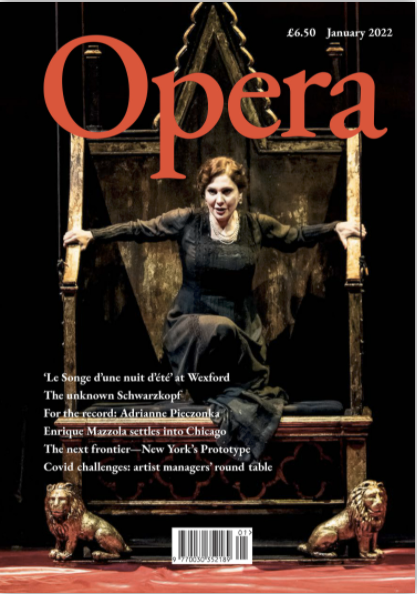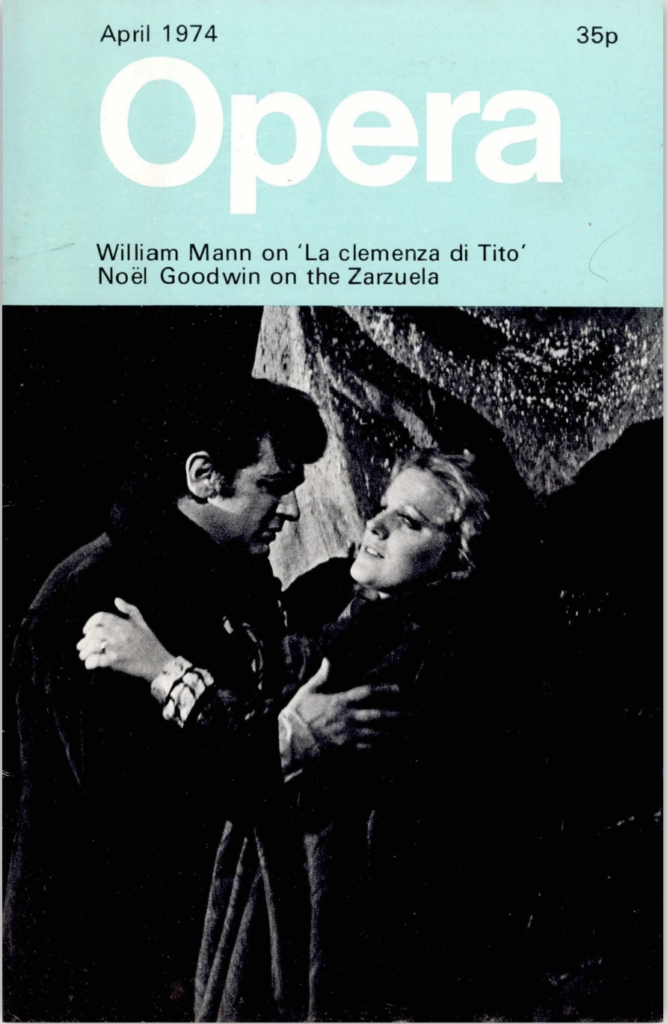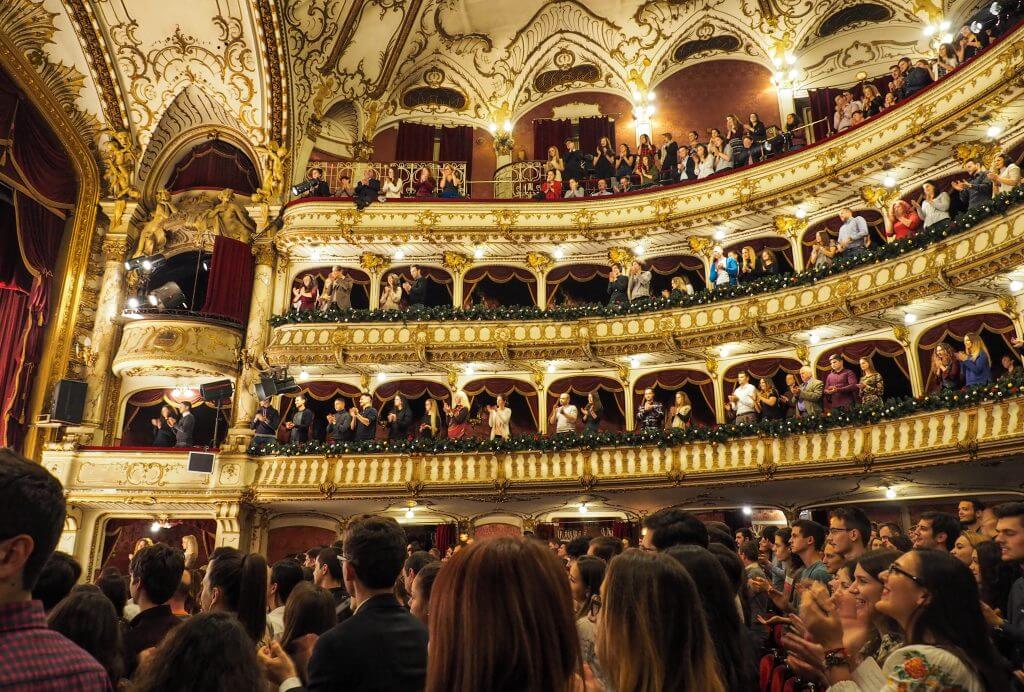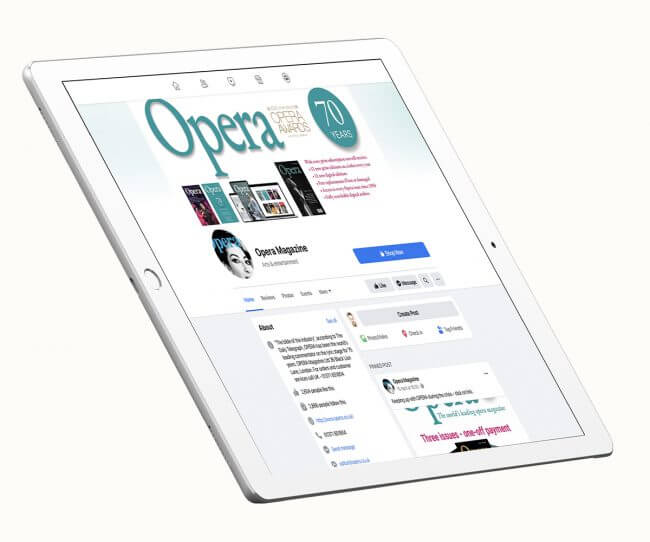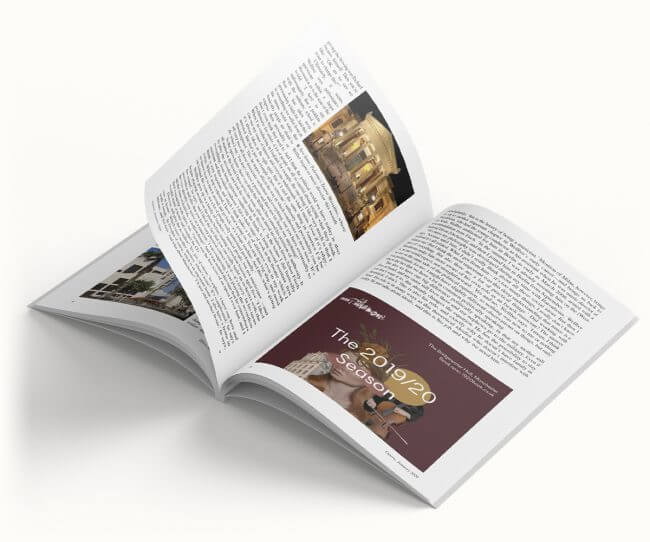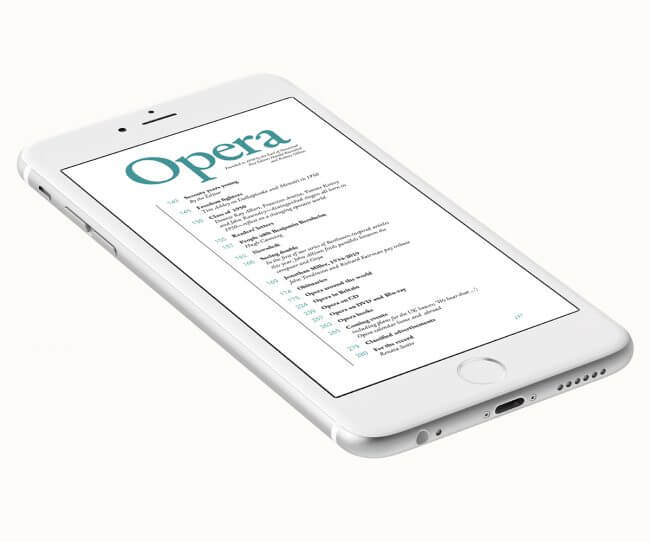Unsecret agents
December 2021 in Articles
As the pandemic changes course again, a group of artist managers explain the effect it is having on their industry
James Black
James Black Management (Rye, UK)
In the run-up to 16 March 2020, in common with my colleagues, I was essentially awaiting disaster. I don’t think any of us had any inkling of how long the crisis would last or that, even as I write this in November 2021, Covid-19 would continue to be so prevalent.
The first week went by in a blur as engagements—so hard won, so eagerly anticipated and so scrupulously prepared for by my artists—were cancelled in the time it took to read an email or, in the case of one courteous company, take a phone call. After two weeks I was tempted to stop keeping a record of engagements and income lost as it was so depressing. Looking back, I try to be charitable recalling some of the scratchier conversations with promoters as I attempted to navigate a way through the quagmire, accepting that the making and implementation of some of the decisions was almost as stressful for them as for my artists and my agency.
Around three months in, I decided that I had to stop being at the mercy of the pandemic. I couldn’t control its effects on my industry but—conscious that this job is hard enough even when the going is good—resolved that I therefore needed to work harder. From the beginning of the crisis I had been writing every week to my artists, partly to keep them informed of any wider-reaching developments but, above all, to let them know that even if there was no work for them, I was not forgetting them or their plight. I instigated Artist of the Day on the JBM YouTube and Twitter platforms, featuring a clip of one of my artists in performance, and began again to write to promoters both in the UK and further afield. My premise was that I was absolutely aware that planning was impractical at the moment, but this did, on the other hand, mean that there might be time for them to examine the materials of artists whose work was new to them.
There were some unexpected successes from this strategy as limited opportunities began to offer themselves. Looking back, I am surprised at quite how much was achieved. I must also pay tribute to those promoters who found new ways to present productions and afford opportunities to artists, many of whom fell completely through the net regarding government financial aid.
Saverio Clemente
In Art Management (Milan)
That we survived is first of all down to the great team in our office, who were so supportive and cooperative even during the worst times. On March 20 we lost Luca Targetti, one of our partners, to the pandemic. This was the saddest and most difficult moment, but my team was marvellous and we all pulled together to survive psychologically.
We realized that the only thing we could really count on was our capacity to ‘dream’ a better opera in a better world. We started up an ‘InArt Academy’ online, on which our artists taught young singers via Zoom. It was a wonderful way to keep energy high and keep our artists connected—and we also discovered that some of them are terrific teachers!
Agencies and artists are now much more careful with contract clauses before signing. During the first wave it was very difficult to accept the way many opera houses were acting, with the closures having taken them by surprise. In the second crisis, most theatres were able to reinvent themselves, with a lot of concerts and streaming which enabled us to survive. Some companies compensated for cancellations, and of course this helped a lot. But in general most of them simply cancelled all engagements.
The knock-on effects of moving productions—especially new productions—into coming seasons are still being felt by all of us. But at least there are some wonderful projects planned for the future. Regarding fees, it seems that Covid stopped the clocks—we have restarted negotiations and discussions from where we were just before the pandemic struck.
Kristin Cowdin
President, Sempre Artists (New York)
‘Knock, knock? Who’s there?’ The aptly titled email from Bill Palant of Étude Arts landed in my inbox on 20 March 2020. Eight days before, opera had come to a grinding halt, starting with the Metropolitan Opera. And then a domino effect of cancellations fell, one by one, across the world. Bill, like all of us, had likely just come through the worst week of his professional life—doing nothing aside from getting news of operas that would no longer happen and then relaying it to clients (singers, directors, conductors). He invited us—technically competitors, but often friendly—to gather on Zoom. That commiseration session a few days later was the first time many had ever logged on to the meeting platform that seems ubiquitous now. We continued to meet weekly. In America, our group was informal but diligent. Our colleagues in Europe were doing the same, and we all came together internationally as well.
The now infamous force majeure clause absolves companies from paying our clients for the countless performances that didn’t happen. Due to goodwill and a love for the singers who bring our art form to the stage, sometimes combined with collective pressure from our group, some money did reach clients from many companies that had hired them. Fees paid ranged from 15 per cent to the exceptionally rare 100 per cent of the contracted gross, sometimes with the promise of rescheduling. In those trying days, we, along with our clients—who simultaneously navigated clunky unemployment registration—have never been so grateful for such modest sums.
Singers are most commonly paid per performance—after those performances are sung—and are in most cases not paid for rehearsals. After accepting an engagement (often years in advance), they must prepare their roles, rehearse and perform before ever seeing compensation. We began working as a unit to enact change so that singers might be paid portions of their fee on schedules: upon signing when possible, upon the start of rehearsals, at the final dress rehearsal, and then following the performances. Changing decades-old practice is not easy. Nor is it fast. But we are already seeing adjustments to some future contracts, thanks to a few particularly intrepid opera companies. And we are making baby steps with adjusting those force majeure clauses so that the financial burden does not fall solely upon the artists.
Managers derive their income solely from commissions paid by artists on the contracts we secure. The amounts range from 10 to 20 per cent, depending upon the type of work and region. That revenue is respectable. However, 10 per cent of a consolation prize of 25 per cent of an artist’s expected fee leaves a large gap. Most American managers lost around 75 to 80 per cent of their income from 2019 to 2020. Some relief for performing arts organizations and venues eventually came through the Shuttered Venue Operators Grant, but not until April 2021. Thankfully, talent representatives were included in the possible recipients. The application process was a maze of ambiguity orchestrated by government officials who do not understand exactly what we do. Again, we collaborated and shared knowledge. Particular thanks go to Aaron Sanko of UIA Talent Agency, a lover of minutiae and accounting. With his help—and piles of paperwork—we all received both initial and supplemental funding that will shepherd us through to what we hope will be the end—of which we see glimpses with each performance before a live audience.
Claire Feazey
Senior Vice President, Artist Management, IMG Artists (Paris)
Are we nearly ‘there’ yet?
Early March 2020 saw me abandon a trip to New York and Boston in the nick of time—just 24 hours before France locked down. November 2021 finds me amid a 12-city tour of Europe to meet and hear long-lost artists who bravely weathered the pandemic. What transpired between those dates remains hard to process or quantify. Each theatre and orchestra dealt with the crisis in its own way and the resulting contract compensation ranged from the sublime to the often ridiculous (read zero). On consulting an international lawyer the truth of the ever-present force majeure contract clause was laid bare and we had to accept we lacked legal leverage and were working on goodwill.
We truly understood and shared the artists’ anger and bewilderment. As time passed, we reluctantly spoke with them about our prognostics for the 2020-21 season, which was shaping up to be a total washout. The darkest moment came mid-winter 2021, with no performances in sight, only a hint of a vaccine rollout plan. It was paralysing. Meanwhile, rescheduling was proving a mixed affair. Some artists were lucky while others seemed to get all their cancellations rescheduled in the same slot and thereby lost out again.
Despite all of this, our artists kept busy. Streaming performances at a tiny fraction of their fees, giving benefit concerts and online masterclasses, working on preparing repertoire ahead of time—it’s the mark of a true artist, this innate and inextinguishable desire to create and communicate against all the odds.
So business is finally back. ‘Hurray!’ we hear you say. But please bear in mind it often involves fewer performances per production, with reduced or frozen fees. Artists are living with an ever-present angst over the show actually ‘getting on’. They rehearse wearing masks and are subjected to endless PCR tests. Offstage they feel obliged to live like hermits. Cases are currently spiralling in Europe and positive tests for fully vaccinated cast members are no longer unknown, resulting in strained conversations about cancellation and yet more loss of income. We seem far away from treating Covid-19 as part of the landscape; its potential to cause chaos remains real.
Meanwhile, a special mention must be made of the up-and-coming generation of artists. They have surely suffered more than most. No opportunities to be discovered, to audition, to launch their careers. As a global team of agents we’re making up for lost time, visiting conservatoires and young artist programmes and ‘group watching’ livestreamed vocal competitions. And yes, our weekly team Zoom meetings thrive and continue as things return to normal—we’d be lost without them.
So, to answer the original question: yes, we’re definitely closer to wherever that moving target ‘there’ might be. Increasing vaccination and booster rates mean one can hope that cancellations will soon be just a bad memory. Meanwhile, here in Paris it’s heartening and healing to witness sold-out performances, the public graciously sporting masks, Covid passports at the ready. It’s surely the greatest validation for the future of live opera. Long may it continue!
Simon Goldstone
Director: Opera, Rayfield Allied (London)
As an agency representing classical musicians, including a substantial roster of opera singers, we had to do our very best to limit the damage to our clients’ careers and, more urgently, to their and our income. What we noticed quite early on was that opera companies that received little or no subsidy—such as many, though not all, US companies—tended to invoke force majeure and pay no compensation for lost engagements. However, in most of the European houses compensation of between 15 and 20 per cent became the norm. In more than one case the full value of the contract was paid. But it wasn’t just the loss of income that affected our clients so badly. Nurturing a singer’s career is about seizing the opportunity at the right time. Singers very often get booked for an opera three or more years in advance. So when, as has been the case in the pandemic, some of our clients lost work that had been a very long time in the planning we had to try to get it rescheduled. Sometimes this worked perfectly but for others, where an opera company moved a title on two seasons, a singer may have found themselves unavailable because they were already booked elsewhere. Many of my clients have lost out on major debuts in this way, which is both frustrating and disappointing.
The start of the current season, coinciding with a reopening of most opera houses, has signalled a cautious optimism. It is heartening indeed to attend live opera and see full houses again. As for the future, I would say it is bright. We are finding that opera companies are, once again, planning far ahead. Perhaps we have noticed a trend towards the more popular operas being scheduled over the coming seasons, so I believe we will see a lot of companies putting on Carmen, Madama Butterfly and La traviata. But this is not to the exclusion of contemporary and new work or even rediscovering forgotten gems. The more adventurous reader might want to make a trip in May to Dortmund to see the late-19th-century French opera Frédégonde, for example, with music by Guiraud, Saint-Saëns and Dukas.
Jonathan Groves
Managing Director, Groves Artists (London)
When I look back over the last 19 months I realize that, on a personal level, my life has changed radically—and in some ways for the better. My income has been drastically reduced but, for the first time in my whole working life, I have taught myself to live in the moment and to take each day for what it brings. Not to have to get up at 5am twice a week to catch an early flight to Europe, followed by a day of meetings, a performance in the evening, a late dinner with my artist and an early flight back the following morning, has been an added bonus.
But I am aware that, after 47 years in the business, I have a different perspective to somebody in their early 30s who might just have started their own business. That will have been very tough. And, most of all, I am acutely conscious of how difficult it has been for so many artists—especially the younger ones who were just getting their feet on the ladder and those who are only now emerging from the conservatoires.
I feel very grateful for the fact that I have quite deliberately kept my company small —largely on the basis that I wanted to spend my life managing artists rather than running a business. This has proved to be a blessing: our overheads are manageable and through a combination of furlough, cost-cutting and a very loyal and understanding staff we have not had to lay anybody off. Perhaps one of the results of the pandemic will be that small might be seen to be if not better, at least a really viable alternative. The advantage of offering artists personal management without having to let the bottom line dictate either the choice of artists, or how they are managed, seems to me considerable.
It remains to be seen how the pandemic will have affected how we all do business in the medium to long term. What, however, is already very clear is that Brexit will drastically reduce the ability of many of our artists to earn a living. Sadly, the UK market is very limited in scale—all the major companies programme many fewer operas than they used to and the proliferation of summer festivals, while offering wonderful opportunities for artists to sing new roles, does not provide regular bread-and-butter employment that can pay the mortgage. This is why, for many years now, so many British artists have earned a substantial part of their income in mainland Europe. The combination of the complications arising out of the 90-day rule, and different visa regulations across the EU—with the understandable reluctance on the part of many European theatres, orchestras and festivals to even contemplate having to deal with these hurdles when they could simply engage an EU citizen—has already had a palpable effect on future bookings. Given the fragility of the post-pandemic recovery, this is truly worrying.
Markus Laska
Melos Opera (Bologna); founder of Opera Managers Association International
As an artists’ manager I prepare and send promotional material, organize auditions, define projects, negotiate contracts, and work on logistics and PR. This is remunerated by the artists I represent once their performance fee is paid, sometimes years after the first casting proposal. If for any reason that performance does not take place, our work goes unpaid.
Thanks to a lot of pressure by artists’ managers’ associations, Intendants and politicians agreed on so-called ‘goodwill payments’ for our artists, which permitted them (and us) to survive, even if the average loss was more than 80 per cent. Even last season, when some performances (in reduced versions) or streamings took place, the majority of performances were still cancelled. The decisions about which performances were ‘saved’ and which not were taken for artistic, economic or programming reasons. Artists’ managers should have been included in this decision process and fairer compensations for cancellations discussed.
As a medium-sized company we got through the crisis better than some. From June 2020 onwards we always had some artists performing. But we are still far from being back to normal. Moving productions to later seasons means there are fewer opportunities to convince theatres to hire new artists. Young and little-known artists are having trouble getting hired. With fewer roles to cast, theatres are organizing very few auditions.
Concerning the future, I am convinced that the gap between extremely well-paid superstars and low-paid young artists will become even more accentuated. In other words: a singer who is 45 years old needs to be considered a big name or risk falling out of the market, as theatres will hire younger, lesser-known singers in order to save the money they need to pay the fees of star artists.
Shirley Thomson
Director, Vocal and Opera, HarrisonParrott (London)
March 2020—a month that very few in the artist management world will ever forget. That dazed and confused feeling as the calls and emails flooded in announcing cancelled project after cancelled project remains fresh in our memories, as does our naivety in believing, after those first shocking cancellations trickled to an end, that life would somehow carry on as planned. None of us was prepared for what was to follow.
A lot of people imagined that we must suddenly be very quiet: if opera wasn’t happening, how could we be busy? I don’t think we’ve ever worked harder. Fourteen-hour days at the desk, on the phone, on Zoom became the norm as we fought through the cancellations, the discussions and arguments about compensation, as we tried to accommodate rescheduled periods into diaries where they didn’t really fit. It made us all realize how much we loved our jobs (normally at least): the conversations with artists and theatres about future plans, the great house debut secured for a young singer that might set them on their path, the major role debut for the more established singer that might launch the next stage of their career—positive things and positive conversations for the main part, and suddenly here we were in some kind of negative hell. Every day during those long months was negative, seeing years of work and planning dissolve before our eyes, feeling like the angel of doom every time we had to make a call to an artist, hearing the anxiety in every freelancer’s voice as they absorbed the latest news, knowing that little or no compensation was coming. It was all made worse by the knowledge there was nothing we could do to help.
Searching for a positive amid the negative, there was an unusual sense of community and mutual support during this bleak period: presenters and managers showing support and understanding for the specific challenges on both sides; singers asking managers how they were coping and whether everyone’s job was safe; managers supporting their colleagues from ‘rival’ agencies and pulling together to share information and updates. We Zoomed from dawn to dusk during those initial months, sharing updates about compensation deals struck with different theatres. We were in it together, doing our best to keep everyone afloat in whatever little ways we could.
Published in Opera January 2022 Volume 73 No. 1
To Subscribe or order issue CLICK HERE


